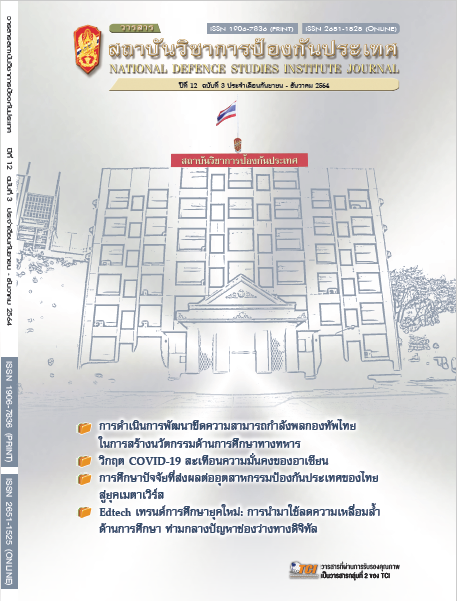The COVID-19 Crisis: ASEAN Security
Main Article Content
Abstract
The article, “COVID-19 Crisis: Security in ASEAN” aims to study the situation, trends and challenges to the security of the world, ASEAN and Thailand during and after the COVID-19 pandemic so as to create suggestions in the form of a policy for ASEAN, Thailand and the Armed Forces in dealing with the threat to their security.
The study has found that the rapid spread of COVID-19 caused the entire world’s economy to fluctuate and shrink immensely, making the revenues and purchasing power of countries around the world come to an abrupt stop in what became known as Global Simultaneous Shocks. This includes nations with large economies such as the United States, members of the European Union, Japan, China and ASEAN countries, including Thailand. At the same time, the pandemic also affected competition among the Super Powers in a significant way. This is because the pandemic reduced the gap in time and space between China and the United States in terms of capacity, resources, righteousness and acceptance by the international community. This has resulted in the emergence of a type of politics that is characterized by the multi-political power pole system. It has also changed social conditions, causing the problems of inequality and poverty to increase. This will affect people’s mental health in the long run and likely increase violence in families. However, the COVID-19 pandemic has increased the role of technology in human livelihoods and business operations, making people rapidly adjust to digital society in what is known as Digital Transformation. The pandemic has also contributed to the better quality of the environment in terms of air and water because of the decrease in travelling and economic activities. At the same time, the amount of garbage has tended to increase, whether it be plastic or contaminated waste, for instance, face masks.
Article Details

This work is licensed under a Creative Commons Attribution-NonCommercial-NoDerivatives 4.0 International License.
The articles, images, tables, graphs, written content, and opinions published in this journal are solely those of the authors and do not necessarily reflect the views or positions of the National Defence Studies Institute or its academic affiliates.
References
จิตติภัทร พูนขำ. (2563). จับชีพจรภูมิรัฐศาสตร์โลกหลัง COVID-19 กับ จิตติภัทร พูนขำ. สืบค้นเมื่อ 19 เมษายน 2563,จาก https://www.the101.world/world-geopolitics-after-coronavirus/
จีนเตรียมมอบหน้ากากอนามัยให้อาเซียน 100 ชิ้น. (2563, 15 เมษายน). เดลินิวส์. สืบค้นเมื่อ 19 เมษายน 2563,จาก https://www.dailynews.co.th/foreign/769116
ชัยยศ ยงค์เจริญชัย. (2563). โควิด-19: ธุรกิจขาขึ้นในช่วงเศรษฐกิจขาลงผลพวงไวรัสโคโรนาสายพันธุ์ใหม่. สืบค้นเมื่อ 17 เมษายน 2563, จาก https://www.bbc.com/thai/thailand-52163423
ถนัดกิจ จันกิเสน. (2563). เศรษฐกิจโลกติดไวรัส OECD ประเมินจะโตต่ำสุดในรอบ 11 ปี. สืบค้นเมื่อ 21 สิงหาคม 2563,จาก https://thestandard.co/oecd-world-economy-infected-by-virus/
ทวีศักดิ์ อุ่นจิตติกุล. (2563, 18 มิถุนายน). เศรษฐกิจโลก ถึงคราวเผาจริง. เดลินิวส์. สืบค้นเมื่อ 24 สิงหาคม 2563, จาก https://www.dailynews.co.th/article/780331/
ธราธร รัตนนฤมิตศร และประกาย ธีระวัฒนากุล. (2563, 18 มิถุนายน). ผลกระทบ COVID-19 ต่อสิ่งแวดล้อม. กรุงเทพธุรกิจ.สืบค้นเมื่อ 21 สิงหาคม 2563, จาก https://www.bangkokbiznews.com/blogs/columnist/125365
พิริยะ ผลพิรุฬห์. (2563, 24 มีนาคม). ผลกระทบทางเศรษฐศาสตร์ จาก “ไวรัสโควิด-19”. โพสต์ทูเดย์. สืบค้นเมื่อ 17 เมษายน 2563, จาก https://www.posttoday.com/finance-stock/columnist/618563
สถานเอกอัครราชทูตสหรัฐอเมริกา และสถานกงสุลในประเทศไทย. (2563). สหรัฐอเมริกาสนับสนุนอาเซียนต่อสู้โรคโควิด-19. สืบค้นเมื่อ 19 เมษายน 2563, จาก https://th.usembassy.gov/th/u-s-support-for-asean-infighting-covid-19-th/
สำนักงานที่ปรึกษาด้านวิทยาศาสตร์และเทคโนโลยีประจำสถานเอกอัครราชทูต ณ กรุงวอชิงตันดีซี. (2020). เทคโนโลยีการสื่อสารที่เชื่อมโยงเราระหว่างโควิด-19. สืบค้นเมื่อ 24 สิงหาคม 2563, จาก http://ost.thaiembdc.org/th1/2020/06/%E0%B9%80%E0%B8%97%E0%B8%84%E0%B9%82%E0%B8%99%E0%B9%82%E0%B8%A5%E0%B8%A2%E0%B8%B5%E0%B8%81%E0%B8%B2%E0%B8%A3%E0%B8%AA%E0%B8%B7%E0%B9%88%E0%B8%AD%E0%B8%AA%E0%B8%B2%E0%B8%A3-%E0%B8%97%E0%B8%B5%E0%B9%88/
สำนักงานสภาความมั่นคงแห่งชาติ. (2563). สถานการณ์ความมั่นคงระหว่างประเทศภายหลังการระบาดของไวรัส COVID-19.สืบค้นเมื่อ 21 สิงหาคม 2563, จาก http://www.nsc.go.th/?p=6974
เสาวณีย์ จันทะพงษ์ และทศพล ต้องทุ้ย. (2563). เศรษฐกิจโลก เศรษฐกิจไทยหลังโควิด-19: โรคปฏิวัติโลกยกเครื่องสู่อนาคตวิถีชีวิตใหม่. สืบค้นเมื่อ 21 สิงหาคม 2563, จาก https://www.bot.or.th/Thai/BOTMagazine/Pages/256303_CoverStory.aspx
Barabanov, O. (2020). When Disasters and Epidemics Become a New Normal. Retrieved August 14, 2020 from https://valdaiclub.com/a/highlights/when-disasters-and-epidemics-become-a-new-normal/
Hussain, N. and Anuar, A. (2020). Global Health Security: COVID-19 and Its Impacts-BRI and Indo-Pacific:Geopolitics of Multilateralism?. Retrieved August 14, 2020 from https://www.rsis.edu.sg/rsis-publication/cms/global-health-security-covid-19-and-its-impacts-bri-and-indo-pacific-geopolitics-of-multilateralism/#.YVGev7gzbIV
Storey, I. and Cook, M. (2020). Same Game, No Winners: COVID-19, U.S.-China Rivalry, and Southeast Asian Geopolitics. Retrieved August 14, 2020 from https://www.eastwestcenter.org/system/tdf/ private/apb507.pdf?file=1&type=node&id=37515
Thai Publica. (2563). รายงาน McKinsey ชี้เอเชียตะวันออกเฉียงใต้เจอ Climate Change แรงกว่าภูมิภาคอื่นของโลก.สืบค้นเมื่อ 24 สิงหาคม 2563, จาก https://thaipublica.org/2020/08/mckinsey-globl-institute-emergingasia-facing-severe-consequences-of-climate-change/?fbclid=IwAR1Z62ZtZklkzDMtPxB6mPqnmZoz4KGfFlUvcfF2QpDls-HWNNPCQsAKxNY
_______. (2563). UNCTAD มองโลกหลังโควิด-19 จากสถิติ (ตอน 2): อาหารไม่เพียงพอ คนยากจนเพิ่มขึ้้น เหลื่อมล้ำด้านดิจิทัล. สืบค้นเมื่อ 24 สิงหาคม 2563, จาก https://thaipublica.org/2020/05/unctad-report-covid-19-changing-the-world-02/


